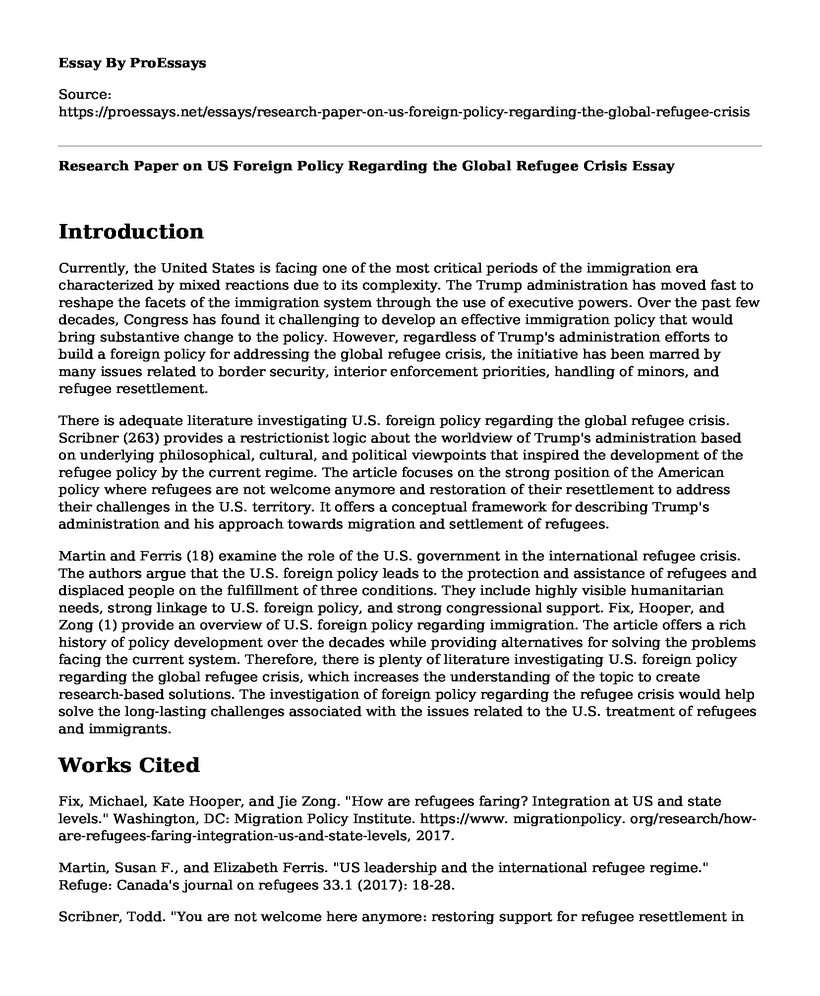Introduction
Currently, the United States is facing one of the most critical periods of the immigration era characterized by mixed reactions due to its complexity. The Trump administration has moved fast to reshape the facets of the immigration system through the use of executive powers. Over the past few decades, Congress has found it challenging to develop an effective immigration policy that would bring substantive change to the policy. However, regardless of Trump's administration efforts to build a foreign policy for addressing the global refugee crisis, the initiative has been marred by many issues related to border security, interior enforcement priorities, handling of minors, and refugee resettlement.
There is adequate literature investigating U.S. foreign policy regarding the global refugee crisis. Scribner (263) provides a restrictionist logic about the worldview of Trump's administration based on underlying philosophical, cultural, and political viewpoints that inspired the development of the refugee policy by the current regime. The article focuses on the strong position of the American policy where refugees are not welcome anymore and restoration of their resettlement to address their challenges in the U.S. territory. It offers a conceptual framework for describing Trump's administration and his approach towards migration and settlement of refugees.
Martin and Ferris (18) examine the role of the U.S. government in the international refugee crisis. The authors argue that the U.S. foreign policy leads to the protection and assistance of refugees and displaced people on the fulfillment of three conditions. They include highly visible humanitarian needs, strong linkage to U.S. foreign policy, and strong congressional support. Fix, Hooper, and Zong (1) provide an overview of U.S. foreign policy regarding immigration. The article offers a rich history of policy development over the decades while providing alternatives for solving the problems facing the current system. Therefore, there is plenty of literature investigating U.S. foreign policy regarding the global refugee crisis, which increases the understanding of the topic to create research-based solutions. The investigation of foreign policy regarding the refugee crisis would help solve the long-lasting challenges associated with the issues related to the U.S. treatment of refugees and immigrants.
Works Cited
Fix, Michael, Kate Hooper, and Jie Zong. "How are refugees faring? Integration at US and state levels." Washington, DC: Migration Policy Institute. https://www. migrationpolicy. org/research/how-are-refugees-faring-integration-us-and-state-levels, 2017.
Martin, Susan F., and Elizabeth Ferris. "US leadership and the international refugee regime." Refuge: Canada's journal on refugees 33.1 (2017): 18-28.
Scribner, Todd. "You are not welcome here anymore: restoring support for refugee resettlement in the age of Trump." Journal on Migration and Human Security 5.2 (2017): 263-284.
Cite this page
Research Paper on US Foreign Policy Regarding the Global Refugee Crisis. (2022, Mar 28). Retrieved from https://proessays.net/essays/research-paper-on-us-foreign-policy-regarding-the-global-refugee-crisis
If you are the original author of this essay and no longer wish to have it published on the ProEssays website, please click below to request its removal:
- Evaluation of Social, Political and Ethical Issues on Gang Violence
- Essay Sample on Women and Employment
- Security Control Measures: Terrorist Groups and Extremist Groups Essay Example
- Asian Americans: The Model Minority in the 1960s Immigration Movement - Essay Sample
- Essay Example on Black Discrimination: Persistence of Prejudice in the US
- Women in WWI: From Home to Warfront - Essay Sample
- Paper Example on Anonymous Reporting: Finding Your Voice to Stand Against Fear







